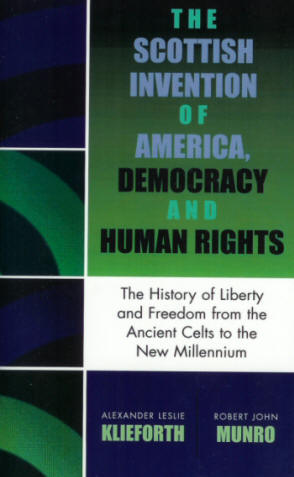The Scottish Invention of America,
Democracy and Human Rights
By Alexander Leslie Klieforth and
Robert John Munro
A Book Review by Frank R.
Shaw, FSA Scot, Atlanta, GA, USA
 This is a book about the birth and
history of liberty and freedom from a Scottish viewpoint.
Without blowing bagpipes or waving their tartans, the authors
set out to prove that democracy and human rights had their
roots in Scotland. The case is well made. The authors
Klieforth and Munro exhaustively review the impact of the
Scots in these two areas. The book begins in 1300 BC and
brings us up to 2004 AD.
This is a book about the birth and
history of liberty and freedom from a Scottish viewpoint.
Without blowing bagpipes or waving their tartans, the authors
set out to prove that democracy and human rights had their
roots in Scotland. The case is well made. The authors
Klieforth and Munro exhaustively review the impact of the
Scots in these two areas. The book begins in 1300 BC and
brings us up to 2004 AD.
The authors present strong and
compelling proof that the roots of liberty and the struggles
for freedom, for individuals and nations, date back to ancient
Celts, followed by the Scottish struggle for independence.
This radical political thought had only been hinted at until
the Scots were willing to walk the talk. Less talk, more walk
is what you get in The Scottish Invention of America.
Most notably, you will learn there
was a lot more to John Duns Scotus than theological papers. In
my opinion, he is the backbone for this book, and it would
benefit all interested Scots to re-read Scotus or, for the
majority of us, to read him for the first time. He was, as the
authors so ably point out, “one of the two foremost moral
philosophers of the European Middle Ages”. The other? Thomas
Aquinas. John Duns Scotus championed human rights, individual
freedom and basically a government that exists only with the
consent of the people, or as we know it today in America, “of
the people, by the people, for the people”.
In Latin, Scotus means “the Scot”.
Born near Stirling Castle in Duns, Berwickshire, he was known
as the Subtle Doctor. Scotus “left behind a monumental work in
the field of metaphysics…” at Oxford. Sent to Paris to
continue his studies, he was expelled from France in 1303 for
siding with the Pope in a dispute with Philip the Fair.
Allowed to return to Paris in 1305, Scotus went on to earn his
Doctorate in Theology and began his professorship. His
“academic and scholarly career led to his international
reputation as one of the foremost medieval scholastics”.
He found himself involved in
another brouhaha about his then radical view of the Immaculate
Conception. Ironically, the Roman Catholic Church universally
accepts his view today. Forced to leave France again, he found
his way to Cologne, Germany where he continued to lecture
until his premature death at the age of 43. Buried in Cologne,
there is this inscription I borrowed from Duncan Bruce’s
The Scottish 100:
Scotia me genuit, (Scotland begot
me)
Anglia me
suscepit, (England reared me)
Gallia me
docuit, (France taught me)
Colonia me
tenet. (Cologne holds me)
And I would add, the freedom
loving countries of this world thank you.
The book does not end with John
Duns Scotus. There is much more that deals with new insights
regarding The Scottish Invention of America (Part Two) and The
Age of Rights of Mankind (Part Three). Space, unfortunately,
does not permit further discussion, but any lover of Scottish
books will want a copy of this unique book for their library.
Any lover of freedom will find this a “must have” book. It is
refreshing writing that offers new insights regarding our
freedom - as individuals and as a nation. Any serious Scottish
student will have a wonderful time with this book. The authors
have done all of us a favor by writing it, so do yourself one
and purchase it! Klieforth and Munro have included a masterful
fifty-page chronology of Celtic, Scottish, and American
events. That in itself is worth the price of a good book, and
this one fits that description. You will spend many enjoyable
hours with this publication. Please note: ISBN 0-7618-2791-9;
published by the University Press of America. For a 15%
discount, please go to
www.univpress.com. (FRS: 11-08-2004)

